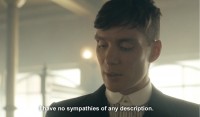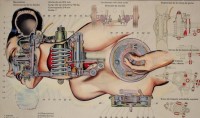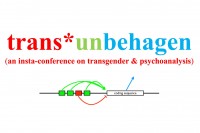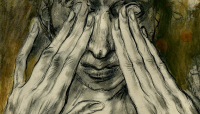Lucas Ballestin: Hipster Politics
Lucas Ballestín analyzes the politics of the hipster, looking to dispel assumptions and use psychoanalytic intuition to explore new ways of thinking the much-hated figure as a response to contemporary political and social conditions. Click here to read the essay published in HKRB
Laurence Rickels: All You Vampires
The title “All You Vampires” summarizes the drift of the presentation by tampering with the title of Robert Heinlein’s time-travel story “All You Zombies” and placing the vampire in the seat of sole survivor (and mourner). To this end I attend to the origin story of the living dead, Richard Matheson’s “I Am Legend.” The contest that reopened at the start of the new millennium between identification with the undead and thrill-a-kill consumerism of the living dead also rereleased but did not contain the prospect of psychopathic violence, of the psycho as our near-miss double at close quarters, which slasher and splatter movies carried out unto therapeutic termination by the 1990s, but which at the time of vampirism’s return to a culture industry monopolized by zombieism found a n...Read More
Marcus Coelen: Schreber – Text and Transference
Schreber does not stop triggering transference. The Memoirs of My Nervous Illness, published in 1903, drew Jung to draw Freud’s attention to it, leading the latter to write his “Remarks on an Autobiographically Described Case of Paranoia” (1911)—and since then an ever growing textual network of writing, speaking, and gesticulating, is thinking psychosis and practicing its language with Schreber and schreberisms in mind. This seminar will be devoted to reading selectively the Memoirs themselves, Freud’s “Remarks” and Lacan’s “On a Question Preliminary to Any Possible Treatment of Psychosis.” Approaching such a voluminous and demanding corpus in a condensed manner might allow us to perceive more clearly how, in each of these instances, the effort is made to respond to madness with both form ...Read More
Jill Gentile: Psychoanalysis, Democracy, Desire
“Might it be that democracy’s enduring relevance and comparative advantage is a tribute itself to its very own special, maybe sacred, relationship to the practice of free speech? Might democracy’s status as a beguiling master signifier reveal that its mission is essentially also a psychoanalytic and semiotic one? Might psychoanalysis’s commitment to free association — freedom of thought and of speech — instantiate, by its very fundamental rule, an ever impossible and elusive but decidedly democratizing mission? The therapeutic action of speech illuminates the life of the word, of the signifier, the movement of which is a sign itself of the liberation of desire’s democratic impulse. Democracy’s semiotic ascendancy reveals speech’s democratizing action. Speech reveals the contagious, r...Read More
Jordan Osserman: On the Foreskin Question
“We have known at least since Foucault that the Victorians were paranoid about, and therefore in the habit of proliferating, sex. Improper, excessive sexuality lurked around every corner, associated with unruly behavior and florid physical ailments, such as the endlessly enigmatic “hysteria.” Childhood masturbation was especially worrying, a focal point of medical concern. In Heckford’s and Sayre’s articles, the fear of childhood sexuality is palpable and laced with excitement. Their patients suffer from “extreme erection,” “nocturnal emissions,” and recurrent orgasms. The symptoms are also feminized: The boys are almost always figured as passive, “delicate,” “clumsy,” “unable to walk without assistance,” coddled by nurses. In keeping with the ideas of some sociologists, Lacan claime...Read More
Psychoanalysis, Art, and the Occult
“We crossed over, in the sense that representatives from different environments shared time-space and actually communicated with each other. And we crossed over in the sense that we genuinely listened to each other with apprehensive ears and minds. We crossed over in the sense that we realised that it’s not just enough to stuff intellectual memes into our already overheated systems. We realised that each and every expression is a vessel, angle and a channel. The main question was if what’s being communicated isn’t actually one and the same thing? Different strokes for different folks, yes, but it’s mainly a terminological challenge, not a signal one. If you don’t allow yourself to be seriously challenged, you’re probably religious. Which just isn’t enough in this day and age.” ...Read More
Das Unbehagen in conversation with Paul Verhaeghe
Summary by Evan Malater Verhaeghe at this point in his career seems interested in accessible models that can be shared beyond the enclaves that speak Lacanian. He gave us a rendition of ideas in his last book, What About Me (Identity is the title in the original, his publisher thought that this hokey title was better for America). Part One recapitulates the major theme of Civilization and its Discontents, the conflict between desire, drives and the needs of civilization. This is further broken down into three eras of civilization: 1) the age of the right orgasm or Victorian times. 2) the age of compulsory free love (post May 1968) and 3) the Age of Enjoyment by installment or the Enron society, which is how he describes the present. Stripped of the Lacanian mouldings, Verhaeghe offers some...Read More
Trans*Unbehagen: What is Trans*Psychoanalysis
Introduction by Evan Malater This event was born from the ashes of a listserv thread that has reached 100 posts and shows no signs of dying. So to start, a passage from a post by Cecilia Wu: “ If it is our goal as a progressive society to maximize the range of gender expression, why bother with the being of gender? Isn’t being notorious for anchoring potential to rosetta stones of yore? Doesn’t being lend itself to the inhospitable crust of identity? Wouldn’t a trans ethic prefer to unyoke itself from the foolishness of imaginary tags, preferring to freewheel? Well, not quite. Trans is not a pure potentiality, just as god is not a free standing authority. There is no connectivity without tethering. God can’t do anything without a body, a body can’t do anything...Read More
Esther Sperber: The Shadow Of Zaha Hadid – Lilith Magazine
“…But alongside my admiration, and slight envy of Zaha Hadid, I hear a small ugly voice whispering in my head. This voice says, “she was too big for life and so she died.” It is true, I admit, that she defied so many social norms, being ambitious, creative and successful, and choosing not to marry or have children. This, the Trump-like-misogynist voice in my head says, was too much; the universe could not maintain this kind of female presence. I hate this voice and can’t believe it resides within me. How is it possible that after years of thinking, lecturing and writing about women in architecture, questioning the current gender roles, a voice like this still persist and haunts me from within my own mind?” Click here to read more
Psychoanalysis and the Occult
Psychoanalysis and the Occult (Case Material on Psychic Reality) April 9 2016 – NPAP Sponsored by Analytica.org and Unbehagen.org Created by Scott Von and David Schweichler Click here for link to audio Thee Psychoanalysis and the Occult symposium took place last week on April 9 2016. It was a unique event in content and form. This topic and its controversies were at the origin of psychoanalysis in the lineage form Mesmer to Charcot to Freud, the censoring of Freud’s research on telepathy from the Traumdeutung, and his early split with his “greatest student” Carl Jung. Jung and Reich both wrote their last books on “UFO”s in the 50s and in the same decade Georges Devereux published a rare book on “Psychoanalysis and the Occult” exposing much material of psychoanalyst’...Read More
A/cephalic Discontents: Group Psychology, The Absence of Myth, and The Knot of Acephale
Scott Jenkins’ Notes on A/cephalic Discontents: Session I: There is a kind of nudity in anonymity, at least as much as there is a mask. The particular pleasure of the discussion: despite its intimacy, nobody in the room was familiar, on terms other than the texts, with more than a handful of others. ◊◊ In addition to those who begin at the beginning, and those who begin at “In the Beginning…”, there was also a royal figure according to whom you begin at the beginning, and go on til you come to the end, then stop. You can stop it with a cut or a plug. Or a question, which is neither, but is how the first session of acephalic discontents concluded at the place where, really, it begins. The question, from A: What is the strategy of acephale? Why Bataille’s project of acephale, the figur...Read More
Guilherme Massara Rocha: The Secret of Her Eyes – Necessity and Contingency in a Fragment of a Psychoanalytic Treatment
When we lose the eye as the phallus that guarantees the consistency of the visual, the blindness that ensues is not simply a non-signifying darkness, but rather an ‘undifferentiated palate of images.’ The event of an ocular castration gives way to a seething imaginary without the security of a local iconography, and in the desperate attempt to arrest this imaginary deluge a ‘volcanic hunger’ is invoked for the final form of the dead body. In facing the faceless terror of a treacherous cadaver that violently sees me, a transformation can begin to unfold whereby the punishing gaze of the absolute other gives way to the voice of an other who asks ‘what do you want?’, and finally to a desire that neither sees nor is seen, that is free to touch the limit of the visual in a place where nobody is...Read More
- 1
- 2























